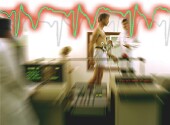 |
 |
 |

Hospitalizations for Heart Failure Skyrocketing
Tripled in past 26 years, government report shows|
|
HealthDay
Monday, July 28, 2008
 MONDAY, July 28 (HealthDay News) -- The number of Americans admitted to hospitals for heart failure has jumped in recent years, and the trend almost certainly will continue, government experts report.
MONDAY, July 28 (HealthDay News) -- The number of Americans admitted to hospitals for heart failure has jumped in recent years, and the trend almost certainly will continue, government experts report.
"Our study covers more than two decades, from 1979 to 2004, and the number of hospitalizations almost tripled during that time," said Dr. Jing Fang, an epidemiologist with the U.S. Centers for Disease Control and Prevention, and lead author of the report in the Aug. 5 issue of the Journal of the American College of Cardiology.
A major reason for the increase is the aging of the American population, Fang said. Heart failure, in which the heart progressively loses its ability to pump blood, is more common among older people.
"Another reason is the improvement in technology for treatment of patients with other heart diseases, such as acute myocardial infarction [heart attack]," Fang added. "So, people with diseases of the heart live longer."
Data from the National Heart Discharge Survey showed that the number of admissions to hospitals with any mention of heart failure rose from 1.274 million in 1979 to 3.86 million in 2004, the report said. More than 80 percent of those admitted to hospitals were 65 or older, with Medicare or Medicaid covering the cost.
The report did not cover the cost of the hospitalizations, but the American Heart Association has estimated it to be more than $20 billion annually, Fang said.
There has been a marked increase in the number of hospitalizations for which heart failure was not the primary cause, the report said. Heart failure was listed as the primary cause in no more than 35 percent of cases, with respiratory diseases and other conditions given as the reason for hospital admission in all other cases.
"Most are due to pneumonia or another disease that makes heart failure worse," Fang said. Better control of those other conditions, which include diabetes and kidney disease, could reduce hospitalizations for heart failure, Fang added.
But those people tend to keep coming back to the hospital because "you cannot cure people with heart failure," Fang said. "The best medicine [we] can do is to keep the heart functioning enough for the patient to have good quality of life."
A basic problem is that there is no effective treatment for heart failure severe enough to cause hospitalization, said Dr. Javed Butler, director of the heart failure research program at Emory University, and co-author of an accompanying editorial.
"When you are talking about medications that have been proven, they all are for chronic, stable outpatients," Butler said. "We don't have any proven medications for treatment in the hospital."
What is needed is a major effort to develop in-hospital treatments for severe heart failure, he said. "When you consider the huge cost, it is right up high on the list of conditions we need to study," Butler said. "It is a least-studied, most costly problem. We need to get a better grasp on what we should be doing."
HealthDay
Copyright (c) 2008 ScoutNews, LLC. All rights reserved.
Related News:
More News on this Date
Related MedlinePlus Pages:
| Home | Health Topics | Drugs & Supplements | Encyclopedia | Dictionary | News | Directories | Other Resources | |
| Disclaimers | Copyright | Privacy | Accessibility | Quality Guidelines U.S. National Library of Medicine, 8600 Rockville Pike, Bethesda, MD 20894 National Institutes of Health | Department of Health & Human Services |
Date last updated: 29 July 2008 |




